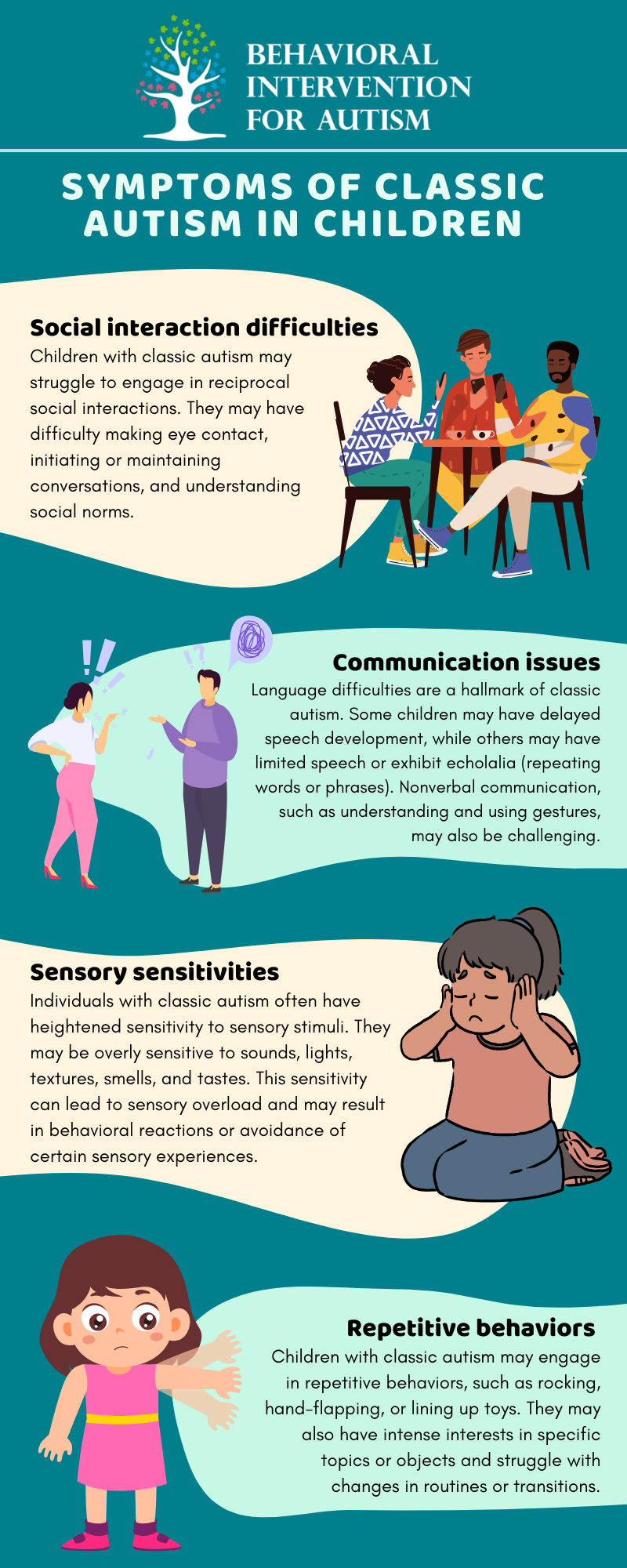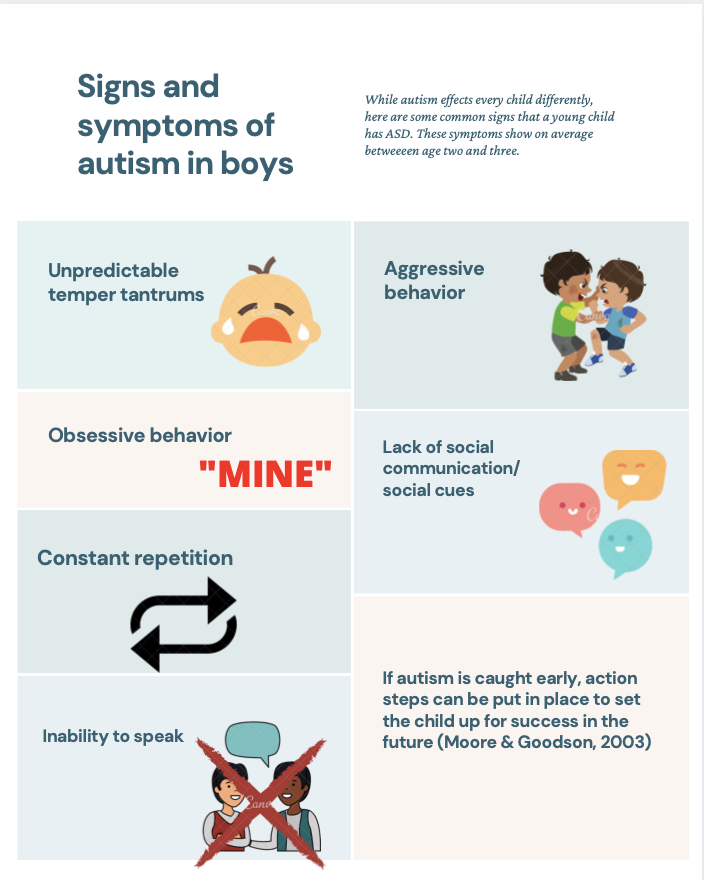With the help of Autism Behavioral Therapy, families can enhance independence in daily routines
With the help of Autism Behavioral Therapy, families can enhance independence in daily routines
Blog Article
Recognizing the Effect of Behavioral Autism on Every Day Life and Social Interactions
You might not realize how deeply behavior autism impacts day-to-day life and social interactions. Individuals on the spectrum often browse a world filled up with communication difficulties and sensory overload. These difficulties can lead to stress and isolation, affecting their relationships and general well-being.
Defining Behavior Autism and Its Attributes
Behavioral autism, commonly referred to as autism range condition (ASD), includes a variety of conditions identified by challenges in social communication, interaction, and repetitive habits. You could see that people with ASD usually have a hard time to interpret social signs, which can cause misconceptions in conversations. They might discover it tough to develop eye call or take part in tiny talk, making social situations really feel overwhelming.
Interaction problems can show up in different ways, from delayed speech advancement to a choice for making use of less words. By identifying these traits, you can cultivate a setting that advertises approval and urges reliable communication, helping individuals with autism grow in their daily communications.
The Spectrum of Autism: Comprehending Irregularity in Behavior
Autism range disorder (ASD) isn't a one-size-fits-all medical diagnosis; it differs commonly among people. You might observe that some people with ASD display light signs and symptoms, while others may deal with a lot more considerable obstacles. This variability can materialize in habits, rate of interests, and sensory level of sensitivities. You might run into individuals who are very spoken and involve quickly in conversations, while others might choose singular tasks or communicate non-verbally.
Moreover, the way people with ASD react to sensory input can vary significantly; some may be overwhelmed by brilliant lights or loud noises, whereas others thrive in promoting environments. The range additionally includes differences in social communications; some individuals may battle to analyze social hints, while others navigate social settings with loved one simplicity. Comprehending this irregularity is crucial, as it assists you appreciate everyone's distinct experience and tailor support to their certain needs, cultivating a much more inclusive setting for everybody.
Communication Difficulties Dealt With by Individuals With Autism
When you engage with individuals on the autism range, you may observe their distinct interaction challenges. They typically face troubles with both nonverbal and verbal cues, which can impact their social interactions. Comprehending these barriers is vital for fostering better connections and support.

Verbal Communication Troubles
Lots of people on the autism spectrum experience verbal interaction troubles that can substantially affect their day-to-day interactions. You could find it testing to express your ideas, sensations, or requires plainly. This can lead to stress for both you and those around you, as misconceptions take place. You may battle with initiating discussions, preserving a topic, or comprehending subtleties in speech. Commonly, you might like utilizing simple language or repeated expressions, which can limit your ability to engage in much deeper conversations. Your pace, volume, or tone may not straighten with social assumptions, triggering others to misinterpret your intents. Acknowledging these challenges can help you and your support network develop methods to enhance interaction and promote much better connections with others in your everyday life.
Nonverbal Interaction Obstacles
Spoken communication isn't the only obstacle individuals on the autism spectrum face; nonverbal interaction barriers can be just as substantial. These challenges can lead to misunderstandings or false impressions of social cues, making interactions feel overwhelming or confusing. By attending to nonverbal communication, you can discover techniques to boost your social experiences and improve your general top quality of life.
Social Interaction Effects
Social communications can commonly feel overwhelming as a result of the distinct interaction challenges encountered by individuals with autism. You could have a hard time with analyzing social signs, making it difficult to recognize mockery or body movement. This can lead to misunderstandings or uncomfortable moments in conversations. Furthermore, launching and keeping discussions might feel challenging, causing anxiousness in social scenarios. You may favor organized atmospheres, making spontaneous interactions uneasy. It's additionally usual to experience problem in involving in small talk, which can impede developing new friendships. Acknowledging these difficulties can assist you discover techniques to improve communication, such as practicing social abilities in secure setups or making use of visual aids - Aba Therapist. Understanding your demands allows you to browse social communications with greater self-confidence and ease.
Social Interaction and Partnership Structure in Autism
While building partnerships can be challenging for individuals with autism, more tips here recognizing their unique perspectives and interaction designs can promote meaningful connections. You may discover that numerous people on the range prefer straight interaction and might struggle with social cues or little talk. By being uncomplicated in your interactions, you can assist develop an environment where they feel comfy.
Involving in shared passions can likewise offer as a bridge to deeper links. Whether it's a hobby, a favorite show, or a common interest, these usual strings can open doors to relationship.
Every Day Life Regimen: Navigating Obstacles and Methods
Steering day-to-day life routines can be particularly testing for people with autism, particularly when unexpected changes take place. To browse these challenges, take into consideration implementing visual timetables or lists.
Developing a routine that consists of sensory breaks can additionally be useful. This assists produce an understanding atmosphere.
Lastly, method mindfulness methods to manage stress and anxiousness. Straightforward breathing workouts or basing methods can make a significant difference. By including these methods, you can boost your day-to-day regimen and lessen disturbances, making life really feel extra convenient.
Strengths and Abilities of People on the Autism Spectrum
Recognizing day-to-day life regimens is simply one aspect of the autism experience. Numerous individuals on the autism range have exceptional toughness and capacities that establish them apart.
Furthermore, your memory abilities typically radiate, specifically in areas of passion. Autism Therapist. This propensity for keeping info can make you an important source in areas like science, modern technology, or art. You may additionally display strong visual thinking, enabling you to picture complicated ideas and fix issues creatively
In addition, your one-of-a-kind viewpoint on the world can promote empathy and understanding in others, enriching social interactions. Embracing these toughness not just enhances your confidence but also aids others value the diverse abilities you give the table.
Producing Inclusive Environments for People With Autism
Producing inclusive environments for people with autism begins with developing sensory-friendly spaces that provide to their special demands. You can additionally promote possibilities for social communication, aiding to construct friendships and links. By making these modifications, you'll add to a much more welcoming environment for everybody.
Designing Sensory-Friendly Spaces
While developing sensory-friendly areas, it's essential to assess the one-of-a-kind requirements of individuals with autism. Beginning by choosing soothing shades and soft lights to create a comforting atmosphere. Include quiet zones where people can pull back and recharge when bewildered. You'll intend to reduce loud sounds and diversions, using soundproof materials or white sound machines to assist keep serenity. Think about responsive aspects like soft fabrics or fidget-friendly objects that can supply convenience. Ascertain that spaces are flexible, enabling for easy rearrangement to accommodate different activities. Consist of visual schedules or clear signs to aid individuals browse the space with confidence. By thoughtfully integrating these components, you can create an inviting ambience that supports sensory requirements and promotes general wellness.
Advertising Social Communication Opportunities
Creating sensory-friendly areas not just addresses individual convenience but also establishes the stage for meaningful social interactions amongst people with autism. Urge peer mentoring, combining individuals with autism with supportive peers that can guide them with social scenarios. By carrying out these techniques, you can enhance social possibilities, assisting people with autism develop friendships and strengthen their social skills in a safe, welcoming setting.

Regularly Asked Inquiries
Just How Can Buddies Support Somebody With Behavioral Autism?
You can support a pal with behavioral autism by being individual, paying attention proactively, and respecting their limits. Involve in activities they delight in, communicate freely, and produce a comfy atmosphere where they really feel valued and comprehended.
What Resources Are Readily Available for Parents of Children With Autism?
You can check out various sources for parents of children with autism, consisting of support teams, educational sites, and local social work. Getting in touch with various other moms and dads can also provide valuable insights and shared experiences to help navigate challenges.
Can Behavioral Autism Modification With Time?

Yes, behavioral autism can alter with time. You might discover changes in communication, social abilities, and behavior as your kid expands. Early intervention and assistance often play crucial roles in these developmental modifications.
Just How Do Sensory Sensitivities Influence Daily Life?
Sensory sensitivities this contact form can make everyday experiences overwhelming. You might deal with brilliant lights or loud sounds, resulting in stress or evasion. Discovering settings that fit your demands can significantly boost your comfort and general life.
What Are Typical Misconceptions Concerning Behavioral Autism?
You may assume behavior autism only influences interaction skills, but it's even more complex. Many presume individuals lack empathy or intelligence, which isn't true. Comprehending these mistaken beliefs helps foster acceptance and assistance for those on the spectrum.
Behavioral autism, usually referred to as autism range condition (ASD), incorporates an array of problems defined by challenges in social communication, communication, and recurring behaviors.Social interactions can usually really feel overwhelming due to the one-of-a-kind communication difficulties dealt with by individuals with autism.Creating sensory-friendly spaces not just addresses specific convenience but also establishes the phase for purposeful social interactions amongst individuals with autism. Motivate peer mentoring, matching people with autism with helpful peers that can direct them with social circumstances. By executing these strategies, you can enhance social chances, helping individuals with Source autism construct friendships and strengthen their social skills in a safe, inviting atmosphere.
Report this page